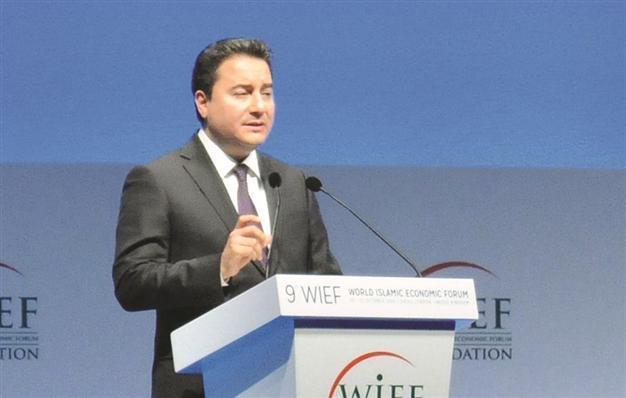Economic interdependency best way to sustainable peace: Deputy PM
LONDON – Anadolu Agency

Deputy PM Ali Babacan delivers a speech at a panel of the 9th World Islamic Economic Forum in London. AA photo
Economic interdependency is the best way to accomplish sustainable peace, Turkish Deputy Prime Minister Ali Babacan said at the 9th World Islamic Economic Forum (WIEF) in London yesterday.“The global economic crisis has shown us with utmost clarity that overcoming challenges requires effective international collaboration,” Babacan said in his speech at the leader’s panel titled “Changing World: New Relationships.”
“When we observed, especially in 2008-2009, what was happening around the world, there were many talks about trade wars, currency wars and protectionism. And we believe that these are actually big traps”, he said. The free movement of goods, capital and people between countries actually benefit citizens and creating win-win outcomes, he said, noting the OECD analysis shows that each U.S. dollar of increased trade protection leads to a drop of 66 cents in the world GDP.
Babacan said a one dollar increase in tariff revenues can result in 2.16 dollar of falling exports and a 73 cent drop in the world economy.
“When we look at the total merchandise trade volume globally, which is now at $18.5 trillion, the Islamic Development Bank (IDB) member countries trade only $400 billion among themselves. So it is just about two percent of the world trade. This shows an untapped potential between Islamic countries. We as Turkey always promote free trade, the free movement of capital, and the free movement of people. We have signed mainly visa abolition agreements and many free trade agreements with our neighbors and beyond,” he said.
The deputy prime minister also said the government believed economic interdependency was the best way to sustainable peace. If countries depend more and more on each other economically, he said, this also will bring sustainability in international relations.
Touching on the global recession, Babacan said a "new terminology" was needed. “When we look at the global economy especially starting in 2008, the huge financial crisis turned into an economic crisis, which caused social crises in many countries, ending with political crises in many cases. So we can use a different terminology for this economic crisis,” he said.
He happily observed that there were some positive signs of recovery in the U.S., in Japan and in Europe, but stressed that "from now on, the sustainability of this recovery, sustainability of growth is going to be very important to follow."
Babacan emphasized that Turkey’s economic transformation had been "substantial." "In the last decade, the total GDP in the country has tripled, inflation has decreased substantially to sustainable levels, the public debt and the budget deficit are just a fraction of what they used to be and exports have increased from $36 billion to $153 billion,” he said.
















